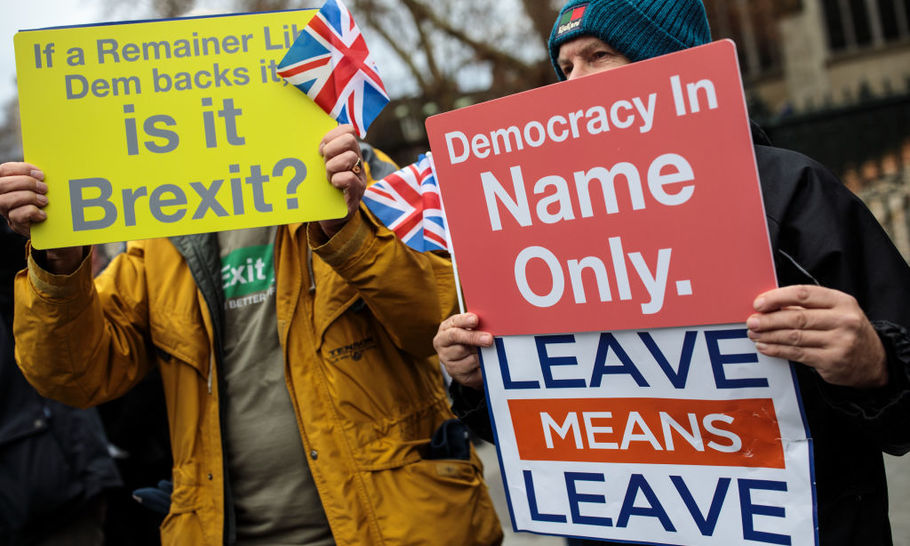None of the paths ahead lead to national unity

Jack Taylor/Getty Images
The vote on the Brexit deal that was to be held tomorrow has been cancelled – reflecting the painful reality that parliament is deeply divided. So is the country at large. Political partisanship is nothing new, of course, but we have arguably not seen any single issue divide the public to this extent for decades. There are sharp differences of opinion between Remain and Leave voters, but also within those groups; there are splits between the four nations, between urban and rural, young and old.
The division has deeply concerned many MPs. In the Commons last week, Chancellor Philip Hammond said that “Our nation is divided… and I fundamentally believe that we have to bring the country back together in order to succeed in the future.” Tory MP Nicholas Soames feared that the UK risked lapsing “into the kind of loathsome and hateful partisan bitterness that now so disfigures American public life.”
MPs are not only concerned about healing the nation’s wounds, but also about their own political prospects. Both Labour and the Conservatives are attempting to appeal to swing voters across the country with a wide range of views on Brexit. This is why Labour’s stance on Brexit is so hard to pin down – it is trying to balance its traditional northern heartlands, which largely support Brexit, with an influx of new younger members who passionately wish to remain.
There is certainly an appetite for a more unified British public. But how is this to be achieved? Despite scathing criticisms of the Withdrawal Agreement from across the country, EU leaders have been adamant that it cannot be changed. Assuming that this remains the case, there are three main scenarios that could play out in the coming months.
The first is that the deal, with a few added “assurances” from the EU, is passed by parliament and then ratified. It is not a foregone conclusion that this would never happen, though it is increasingly unlikely. Many politicians have supported the deal – however reluctantly – as a compromise that could unite the different sides of the argument. Cabinet Office Minister David Lidington tweeted that the deal had something for both Leave and Remain voters: “The 52% get control of laws, money, borders + out of CFP; the 48% get closer trade partnership with EU than Canada or any advanced economy + cooperation on police and security. Time for country to come together & #BacktheBrexitDeal.”
In reality, however, the deal has alienated many on both sides. Many Brexiteers claim that it keeps us too closely tied to Europe, while committed Remainers hate the idea of leaving. Moreover, the Withdrawal Agreement is merely the start of trade negotiations with the EU: we will be in a transition period for as long as three years and nine months, which would allow splits over the country’s direction to re-emerge. This problem also affects the “Norway-for-now” option of staying in the EEA while a trade deal is negotiated. Leaving aside the political issues associated with this, it will not please Brexiteers, who want a cleaner break, nor Remainers, who will wonder why we are leaving at all.
A second scenario is a No Deal Brexit. Warnings have poured in of the potential large-scale economic consequences of this outcome, but the social consequences would also be damaging. Last week, Kent Council suggested that a No Deal Brexit could lead to rubbish being uncollected, children unable to take exams, and dead bodies going unburied, all due to traffic congestion at the port of Dover. Such damaging effects could reduce social cohesion at a time of considerable national vulnerability. As such, most MPs agree this would be the worst possible outcome both economically and socially.
A final scenario is an election or a second referendum. No party has a significant lead in the polls and an election would likely do little to break the impasse. Many have instead called for a second referendum – a “People’s Vote” – with Remain on the ballot paper. They argue that, now that we know what the deal looks like, it is the Government’s duty to hand the vote back to the people – and so break the deadlock in parliament, and ensure a final answer to the Brexit question that the country can support.
Setting aside the political and legal arguments for or against the vote, it is questionable whether this would really resolve issues of national disunity. Many Leave voters will feel insulted at being asked the same question again, possibly to the point of civil unrest. Moreover, there is no real guarantee that either side would accept the outcome. If Leave wins, Europhiles will continue to lament what we have lost. If Remain wins, why should Leavers respect this second result if Remainers do not appear to have respected the first?
A Yougov poll from 4 December has shown that out of three choices – the deal, no deal, and remaining in the EU – 27% of the public would support the deal, 27% want no deal, and 46% wish to remain in the EU. Hence no majority for any outcome. It is possible that a future government will pursue an economic path – in or out of the EU – that ensures continued prosperity, employment, and security. It is not clear, however, that any of the options outlined above will heal the national divisions over Brexit.




